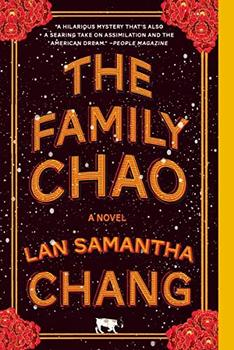Book Club Discussion Questions
In a book club? Subscribe to our Book Club Newsletter and get our best book club books of 2025!
For supplemental discussion material see our Beyond the Book article, The Brothers Karamazov and our BookBrowse Review of The Family Chao.
Please be aware that this discussion guide will contain spoilers!
- Lan Samantha Chang's The Family Chao is rife with lost possessions: Alf, the blue carpetbag, and the jade ring, to name a few. What else was lost? How do these lost items progress the plot? What is their symbolic function?
- Why is Katherine's appetite for Chinese food full of "complications" that are "played out in the real world, not in her palate"? (p. 81) How does this compare to Ming's rejection of Chinese food? What does this suggest about the relationship between food and belonging? Are there any foods or meals in your life that help you perform particular identities?
- The Family Chao is divided into two parts: "They See Themselves" and "The World Sees Them." How do these sections differ in terms of tone, narrative voice, and subject? Who is "the world"? Who are "they"? How do both interrelate? What does this distinction imply about your presence as a reader?
- To what extent does the aphorism "Like man, like dog" (p. 61) capture the novel's exploration of desire? How do dogs appear throughout the novel, and what might this motif signify?
- How does the idea of sacrifice resonate throughout The Family Chao? What does each character sacrifice? For whom? With what intentions? In what social, political, and economic contexts? How do your experiences shape your emotional connection to each character's struggles?
- Ming tells James that "America is not a democracy, it's not a place of opportunity...if you can't choose to be white" (p. 94). How does The Family Chao's narrative uphold this statement?
- From her hospital bed, Winnie asks Dagou, "If you don't love your father, how can you begin to love the world?" (p. 111) How does this interaction explore themes of familial duty and loyalty? How do protagonists define themselves through family? How do different characters' understandings of love shift throughout the novel? In what way does your experience of love influence your reading?
- In her blog, Lynn asks, "Will the jury believe a flawed but heartfelt Asian man?" (p. 273) What does Lynn's firsthand blog offer the reader? In what way does her perspective of the trial differ from its media portrayal? How do these differences engage with Fang and James's discussion of the children's book The Five Chinese Brothers? What might this suggest about the relationship between race and criminal justice?
- Deciding on Dagou's guilt, Judge Lopate asserts that "We are not merely victims of fate" (p. 277). Can you think of examples from the novel that either support or undermine Lopate's claim? What literary techniques does Chang use in this regard? How do you interpret the role of fate in your life?
- What do you make of O-Lan? How do you relate to her motivations? Do you feel empathy? Anger? Understanding? To what extent is O-Lan the most autonomous character? How might O-Lan's character tie into the novel's wider themes of visibility and invisibility?
- What do you make of the relationship between James and Alice? What drives their interest in each other? How does their connection develop over the course of the novel? Why does Alice end the relationship?
- James lets O-Lan escape because "It is more terrible to be a daughter of Leo Chao—worse to be his Chinese daughter than his American son" (p. 271). How does James's recognition, and the novel more generally, explore the intersections of race and gender?
- In confession to Alice, James says, "We're all guilty. We let this happen under our watch. We let him mistreat her and we let one us of do something unconscionable" (p. 274). Who is "guilty," and of what? To what extent do we all share in this guilt?
- The novel ends as O-Lan, gazing at the desert's "dream of tranquillity," recognizes that her siblings share "the blood of the thief, the pioneer and the marauder, the yearner and the usurper" (p. 296). How do these archetypes influence your read of the novel? Does this ending offer any form of closure? Why?
Unless otherwise stated, this discussion guide is reprinted with the permission of W.W. Norton & Company.
Any page references refer to a USA edition of the book, usually the trade paperback version, and may vary in other editions.
